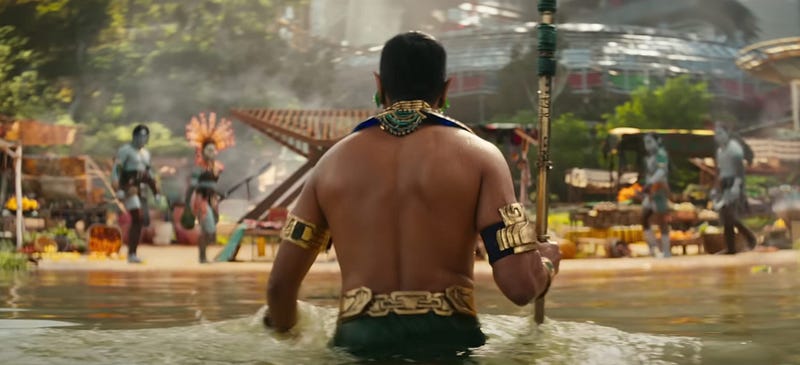Ryan Coogler delivers a vibrant and poignant affair that is often muddled by Marvel’s grand plan

The weight upon Black Panther: Wakanda Forever is palpable. The sad loss of star Chadwick Boseman left writer/director Ryan Coogler (and co-writer Joe Robert Cole) with an unenviable task: not only reworking the logistics of the film, but also making it serve as a worthy tribute to the man who leaves behind a large void at its core. The other consideration hanging over Coogler is the film’s service to the wider Marvel Cinematic Universe (MCU), which, as with so many Marvel films of late, proves to be the real stumbling block.
The film opens with a family and nation plunged into mourning after the loss of their iconic King T’Challa. A year later, Queen Ramonda (Angela Bassett) finds herself maneuvering on the world stage as other nations, sensing weakness in Wakanda, push their luck trying to seize its technology and vibranium for themselves. An American search for the precious ore outside the nation’s closely guarded borders detects vibranium at the bottom of the ocean. However, this expedition encroaches on the territory of the secretive nation of Talocan, home to a species of humanoids who have thrived in an underwater realm for hundreds of years.
With their anonymity under threat, Talocan leader Namor (Tenoch Huerta Mejía) meets with Wakanda to form an alliance and take preemptive action against the Western nations. But pressure to acquiesce to Talocan’s terms and align to their ideals precipitates another conflict for Wakanda, one that looks to pose an insurmountable challenge not just for their technologies, but also for their spirit.

The film largely handles the death of T’Challa with resonant sorrow and surprising grace. An opening sequence is dedicated to the character’s (off-screen) departure and the ceremony to celebrate his life. But this loss permeates the entire film. Coogler affords time for each of the key figures in the film to reckon with their loss and the legacy they strive for in the wake of T’Challa’s passing. The exception is Shuri (Letitia Wright), who buries herself in work and science rather than embracing emotion and tradition. The discovery of the threat to Wakanda helps to wake her from her stupor and begin a path to action so she can heal herself and her wavering country.
The arrival of Namor, revered as a god called K’uk’ulkan, is the other big focus of the film. We learn that the Talocan came from a tribe of Mayans who sought refuge from the smallpox and savagery of invading conquistadors in the 1500s, ventured to the ocean floor, and built an an empire on the back of vibranium. The plot plays to another part of T’Challa’s enduring legacy, where he was looking to break the bubble of isolationism, and connect with the outside world—acts that brought a spotlight upon vibranium and, eventually, to Talocan’s door. Namor might lack the sheer anger of Killmonger, but he is similarly rooted in post-colonial fury. His fear at being unable to protect his loved ones is well mirrored by Shuri’s arc, and the film’s conflict rests on how they process these changes.
While these aspects of the film harmonize, the connections to the wider, future MCU disrupt the plot. The introduction of Riri Williams (Dominique Thorne) feels entirely unnecessary and underwritten and is a superfluous load for the film to bear just to help set up a Disney+ series. The return of Everett Ross (Martin Freeman) and another (no spoilers) character also plays more toward other Marvel projects than the one at hand.
Wakanda Forever also feels like it has fallen into the same trap of other Marvel ventures, where a discovery or tech advancement offers a convenient solution to a problem. It’s ironic that as Wakanda has opened up, so has the Black Panther series.
Despite these issues, Coogler largely cuts through the clutter and reminds us of his prime intent, wrangling a blockbuster with the approach of an auteur. In showing what could be, Wakanda Forever scrutinizes the colonial powers of the west for their past indiscretions and for those they continue to perpetuate in the present. Like grief, the effects of slavery and colonialism echo for a long time. These themes and the shifts in power in Wakanda Forever look to stoke the geopolitics of the later Captain America films. The action is altogether tighter this time out, supported by a great step up in the quality of the CGI. Production creativity continues to dazzle, notably an electric score from Ludwig Göransson and the superb costume design of Ruth Carter (the Abe Sapien outfit aside).
Coogler’s craft again focuses on the character-driven moments, and he is aided in this by a stellar cast. Danai Gurira, Winston Duke, and Lupita Nyong’o slip back into their roles and add nuances of burden and loss, as well as drive and hope. Huerta Mejía is a magnetic presence onscreen and deftly adds grit and grey to the MCU while drawing empathy for his situation. Wright wobbles at times, but shows glimpses of the potential with which she might fully embrace a role that seems to be mapped out for a few years (and movies) down the line. Bassett is an absolute force of nature, be it with a barnstorming speech or quieter moments; her regal, maternal presence anchors the whole film. You really have to applaud what a bold, Black, and woman-driven film this is.

Black Panther: Wakanda Forever might fall short of its predecessor, but it is undeniably the highlight of Marvel’s phase four. Setting aside the more muddled aspects of the film that serve the burgeoning and bloated MCU, Coogler again crafts a soulful and even cathartic venture. It is a treatise on grief and loss that takes the pride that comes with cries of “Wakanda Forever” and instills in it a sense of poignancy and promise.
Black Panther: Wakanda Forever hits theaters on November 10th.




